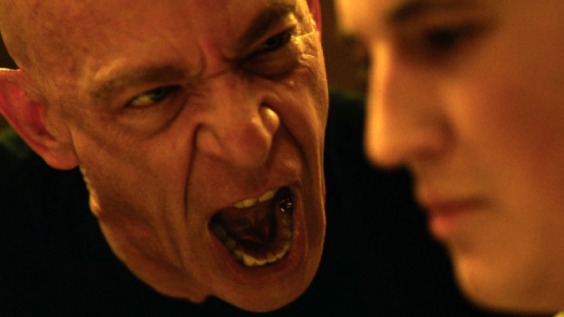I somehow made it through awards season without seeing many of the Academy Award Nominated films. Maybe I’ve been playing too much Fire Emblem: Awakening with the shades drawn. Anyway, I’ve gradually started to see more of them. Last night, Whiplash became the latest.
The film stars Miles Teller as Andrew Neiman, an ambitious jazz drummer at a competitive music conservatory, and J.K. Simmons as Terence Fletcher, an emotionally abusive music teacher. The film centers on the relationship between Neiman and Fletcher, examining Neiman’s thirst for greatness that is only swollen by Fletcher’s search for extraordinary talent.
Though Teller delivers an excellent performance, Simmons really steals the show (I mean, he did win the Oscar). Anyone can yell and scream obscenities, but Simmons balances those scenes with kind, almost touching moments of humanity. In one scene, for example, Neiman glimpses his teacher meeting with a friend and his daughter backstage before a show. Fletcher says to his friend’s daughter, “I’m so sorry, can I have your autograph?” And then later, “What do you say, you ready for Carnegie Hall?” It’s not said with the biting sarcasm he uses elsewhere in the film, though; it’s a surprisingly sweet scene.
Simmons’s Terence Fletcher is certainly a villain; there’s no questioning that. But, like any truly good villain, he’s still a person.
There’s another telling scene toward the end of the film in which Fletcher reveals his teaching style to Neiman. He says, “…it’s about pushing people beyond what’s expected of them. And I believe that is a necessity. Because without it you’re depriving the world of its next Armstrong. Its next Parker.” And then comes the line that probably encapsulates the character best: “There are no two words more harmful in the entire English language than ‘good job.'”
It’s an amazing scene because Fletcher justifies his aggressive teaching style. And though we as the audience probably didn’t understand him before (when he was slapping students, hurling chairs at them, and forcing them to play into the late hours of the morning), we might understand him now. This is the mark of an excellent fictional villain: one who commits reprehensible acts, yet reasonably justifies her/his actions.
Now I don’t want to diss the classic evil dude archetype. The Anton Chigurhs, Saurons, and Freddy Kruegers of film and literature are often just as awesome as their more rounded counterparts. But that sort of villain is seen less and less in modern stories. Filmgoers and readers seem far more interested in villains like Terence Fletcher, speaking generally. Guys like The Joker, Jaime Lannister, and Hans Landa are popular villains for a reason. It’s because people seem to be looking for villains with well-rounded psychologies and compelling motives for their evil acts.
Whiplash certainly doesn’t pass judgment on Fletcher’s actions either way. In fact, at the end of the film, Neiman does become Fletcher’s greatest student.
And when the villain helps the hero achieve his dreams, you’ve got to admit…that’s a new (and pretty cool) kind of villain.



